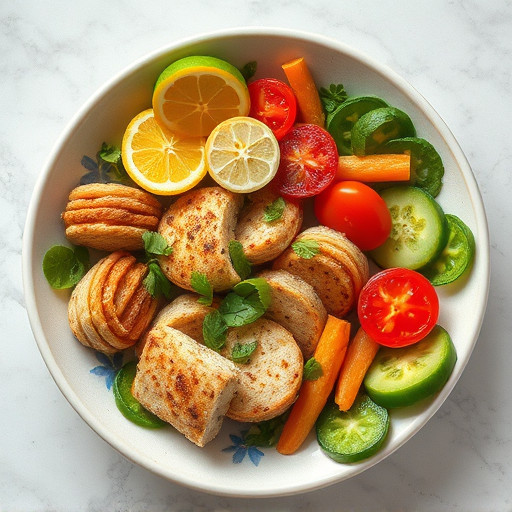The Mediterranean diet emphasizes balance and overall well-being through a variety of nutrient-rich foods like fruits, vegetables, whole grains, healthy fats, lean proteins, and moderate dairy intake. It encourages social dining and daily physical activity. Prep by stocking your pantry with whole grains, legumes, nuts, seeds, herbs, spices, and olive oil. Plan balanced meals with half vegetables/legumes, a quarter whole grains, and another quarter lean protein. Incorporate healthy fats, replace refined carbs with whole grains, and snack on nutritious options like fruits or yogurt. Use herbs, spices, and olives for flavorful meals. Promote heart health with monounsaturated/polyunsaturated fats from avocados, nuts, seeds, olive oil, and fatty fish. Stay hydrated with 8 glasses of water daily; limit wine consumption to avoid dehydration and health risks.
Adopting a Mediterranean diet can be a game-changer for your health and well-being. This dietary pattern, inspired by the traditional eating habits of countries bordering the Mediterranean Sea, emphasizes whole foods, healthy fats, and fresh produce. In this guide, we’ll walk you through preparing for and embracing this lifestyle change. From understanding the core principles to stocking your pantry with key ingredients and planning balanced meals, these steps will empower you to start your Mediterranean journey on the right foot.
- Understand the Mediterranean Dietary Pattern
- Stock Your Pantry with Essential Foods
- Plan Balanced Meals and Snacks
- Embrace Herbs, Spices, and Olives
- Focus on Healthy Fats and Oils
- Stay Hydrated and Limit Alcohol Consumption
Understand the Mediterranean Dietary Pattern

The Mediterranean diet isn’t just about eating olive oil and grilled fish; it’s a way of life inspired by the traditional dietary patterns of countries bordering the Mediterranean Sea, like Greece, Italy, and Spain. This diet emphasizes whole foods, plant-based sources, healthy fats, lean proteins, and moderate wine consumption (often during meals). It encourages enjoying meals with others and incorporates physical activity into daily routines.
At its core, this dietary pattern promotes a balance of nutrients from various food groups. Fruits and vegetables are staples, providing essential vitamins and minerals. Whole grains like oats, quinoa, and brown rice offer complex carbohydrates. Healthy fats, mainly from olive oil, nuts, seeds, and avocados, contribute to heart health. Lean proteins come from fish, poultry, beans, and legumes. Dairy is consumed in moderation, primarily through yogurt and cheese. Herbs and spices add flavor without the need for excessive salt or sugar.
Stock Your Pantry with Essential Foods

When prepping for a Mediterranean diet, one of the first steps is to stock your pantry with essential foods that form the foundation of this healthy eating pattern. This involves replacing processed and high-fat items with whole grains, legumes, nuts, seeds, and an abundance of fruits and vegetables. Oats, quinoa, brown rice, and whole wheat pasta are excellent choices for complex carbohydrates. Canned beans, lentils, chickpeas, and dried peas offer convenient protein sources while also adding fiber to your meals.
Nuts such as almonds, walnuts, and pistachios, along with seeds like flaxseeds and chia seeds, provide healthy fats, vitamin E, and omega-3 fatty acids. Herbs and spices like oregano, basil, rosemary, and garlic add flavor without extra calories or salt. Olive oil, a staple in the Mediterranean diet, is best chosen as a cooking or dressing ingredient due to its high monounsaturated fat content. With these pantry staples in place, you’ll be well on your way to enjoying delicious and nutritious meals that align with the Mediterranean dietary pattern.
Plan Balanced Meals and Snacks

When preparing for a Mediterranean diet, planning balanced meals and snacks is key. This means incorporating a variety of foods from all food groups in appropriate portions. Focus on filling half your plate with vegetables and legumes, a quarter with whole grains, and another quarter with lean protein sources like fish, poultry, or plant-based alternatives. Include healthy fats such as olive oil, nuts, and seeds to add flavor and nutriments without excess calories.
Consider replacing refined carbohydrates with whole grain options like brown rice, quinoa, and whole wheat bread. Snacking is an important part of this diet, so opt for nutritious choices like fresh fruits, yogurt, or a handful of nuts. Remember that portion control is crucial; a serving size should be about the size of your palm or a small bowl of vegetables. By planning meals with these guidelines in mind, you’ll ensure you’re getting the full benefits of a Mediterranean diet rich in vitamins, minerals, and healthy fats.
Embrace Herbs, Spices, and Olives

Herbs, spices, and olives are integral to the Mediterranean diet, offering a rich array of flavors that can elevate your meals. Embrace these natural ingredients to bring a taste of the Mediterranean to your kitchen. Fresh herbs like basil, parsley, and oregano add vibrant, earthy notes to dishes, while spices such as cinnamon, nutmeg, and turmeric provide warmth and depth. Olives, whether green or black, are a staple, offering a unique saltiness that balances out savory meats and creamy cheeses.
Incorporating these elements into your meals is easy. Toss fresh herbs into salads, use them to season vegetables, or add them while cooking grains like quinoa or brown rice. Spices can transform simple dishes; a pinch of cinnamon in oatmeal or turmeric in roasted vegetables adds unexpected complexity. Olives make for a delicious snack on their own or as a topping for bread, and they pair wonderfully with grilled meats, pasta dishes, or salads.
Focus on Healthy Fats and Oils

The Mediterranean diet emphasizes the use of healthy fats and oils, which are integral to its heart-healthy benefits. Replace saturated and trans fats with monounsaturated and polyunsaturated options. These can be found in foods like avocados, nuts, seeds, olive oil, and fatty fish such as salmon, tuna, and sardines. Olive oil, a staple in Mediterranean cuisine, is particularly rich in monounsaturated fats, which help lower bad cholesterol levels while raising good cholesterol.
When transitioning to this diet, start by swapping out butter for olive oil or avocado in your cooking. Opt for nut butters instead of their creamier, less healthy counterparts. Include more fish in your meals, choosing sustainable options whenever possible. These simple substitutions will not only support your overall health goals but also allow you to enjoy the delicious flavors and textures that make the Mediterranean diet so appealing.
Stay Hydrated and Limit Alcohol Consumption

Staying hydrated is a key component of the Mediterranean diet, which emphasizes the consumption of plenty of water throughout the day. This dietary pattern encourages drinking at least 8 glasses (or approximately 2 liters) of water daily. Water is essential for overall health and aids in digestion, nutrient absorption, and maintaining energy levels. It also helps control appetite and promotes a healthy skin complexion.
Additionally, moderating alcohol intake is crucial. The Mediterranean diet allows for occasional wine consumption, typically one glass per day for women and up to two glasses for men. However, it’s important to limit other alcoholic beverages. Excessive alcohol can lead to dehydration, which counteracts the hydration benefits of the diet. Moreover, high alcohol intake is linked to various health issues, including weight gain, liver damage, and an increased risk of certain cancers, making it vital to adhere to moderate consumption guidelines.
Adopting a Mediterranean diet is not just about food choices; it’s a lifestyle shift that prioritizes balance and harmony. By understanding the core principles outlined in this article, you’re well-equipped to embark on a journey towards better health and well-being. Remember, consistency is key – stock your pantry with healthy essentials, plan meals that delight your taste buds while nourishing your body, and embrace the vibrant flavors of herbs, spices, and olives. Enjoy the process of discovering new recipes and savoring each bite as you make positive changes to your diet.


